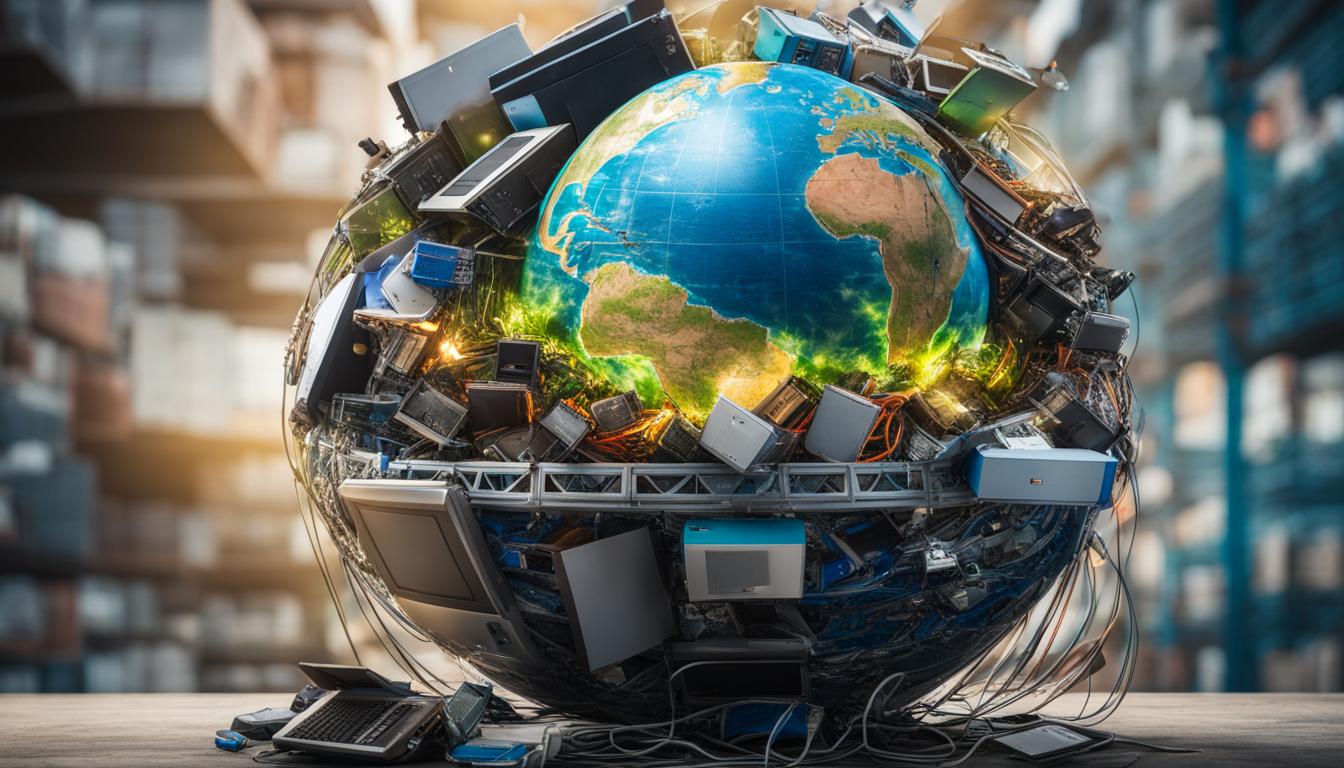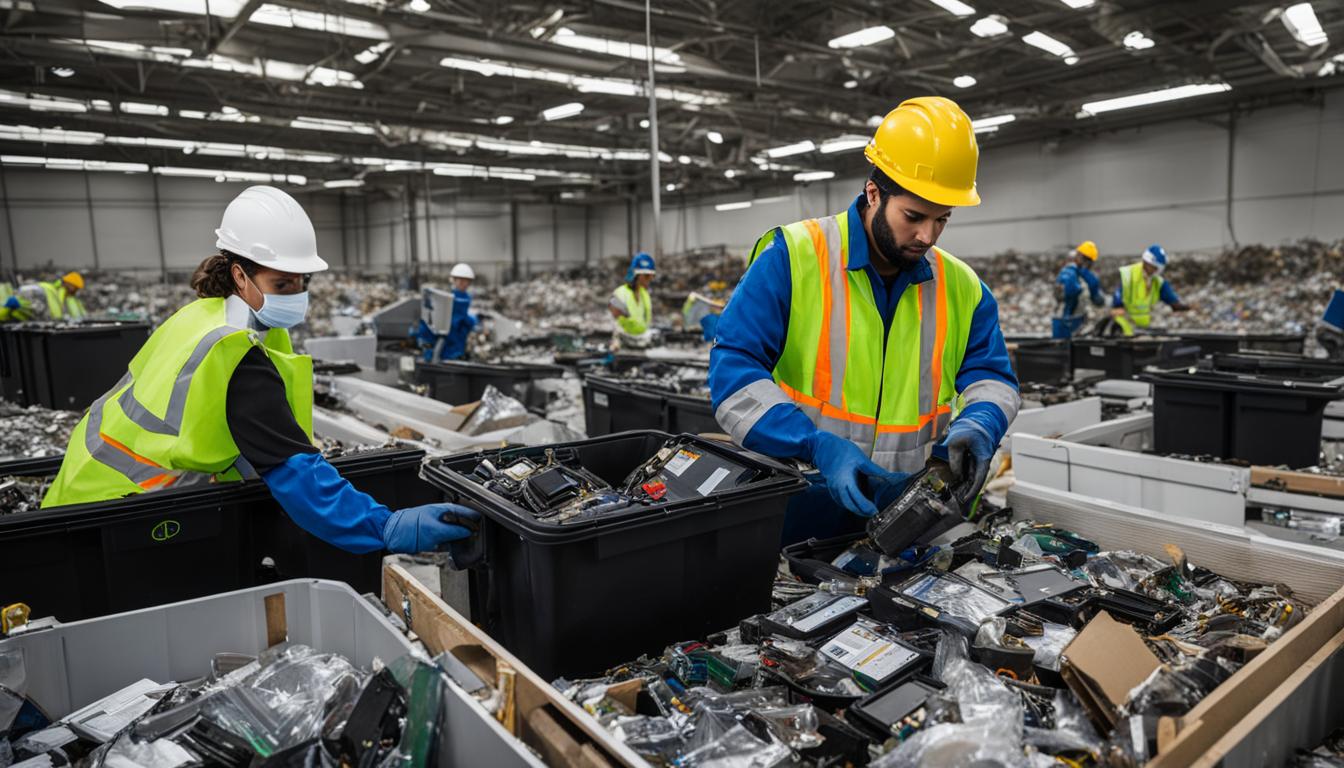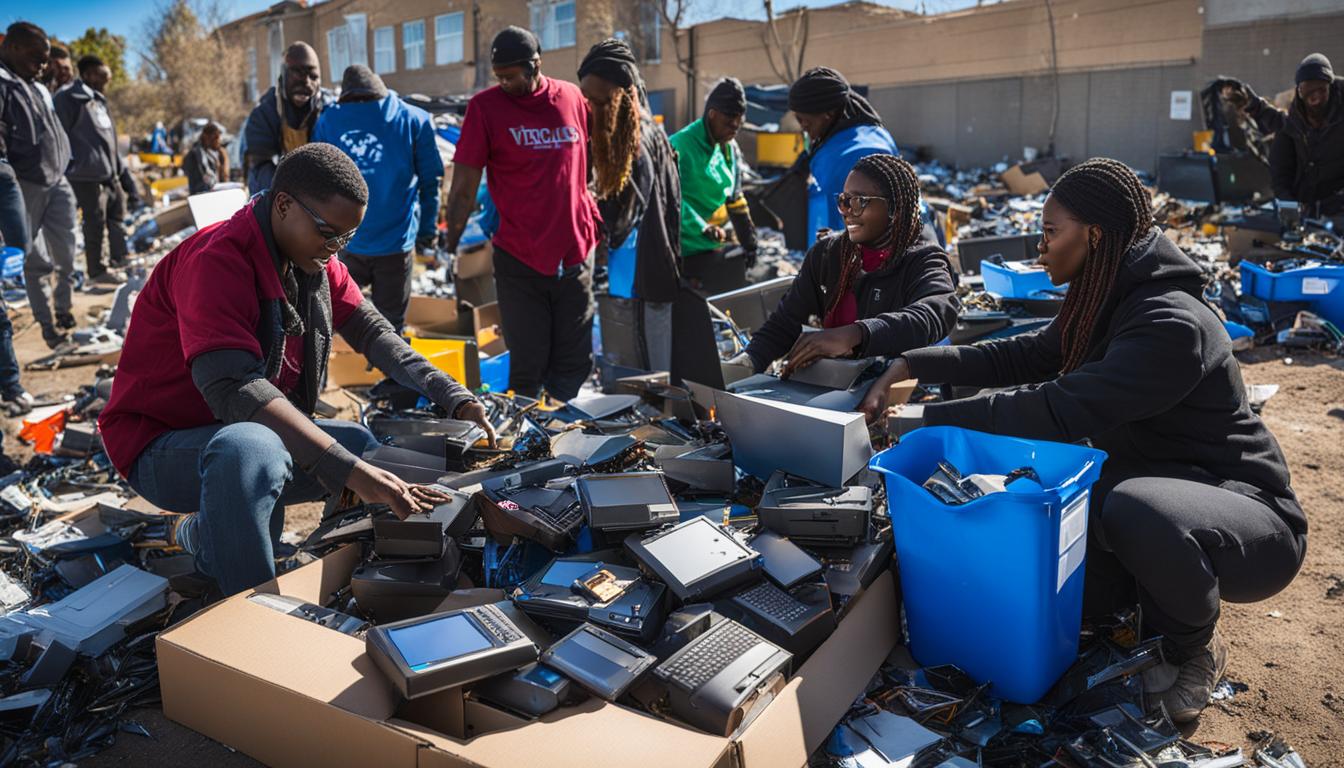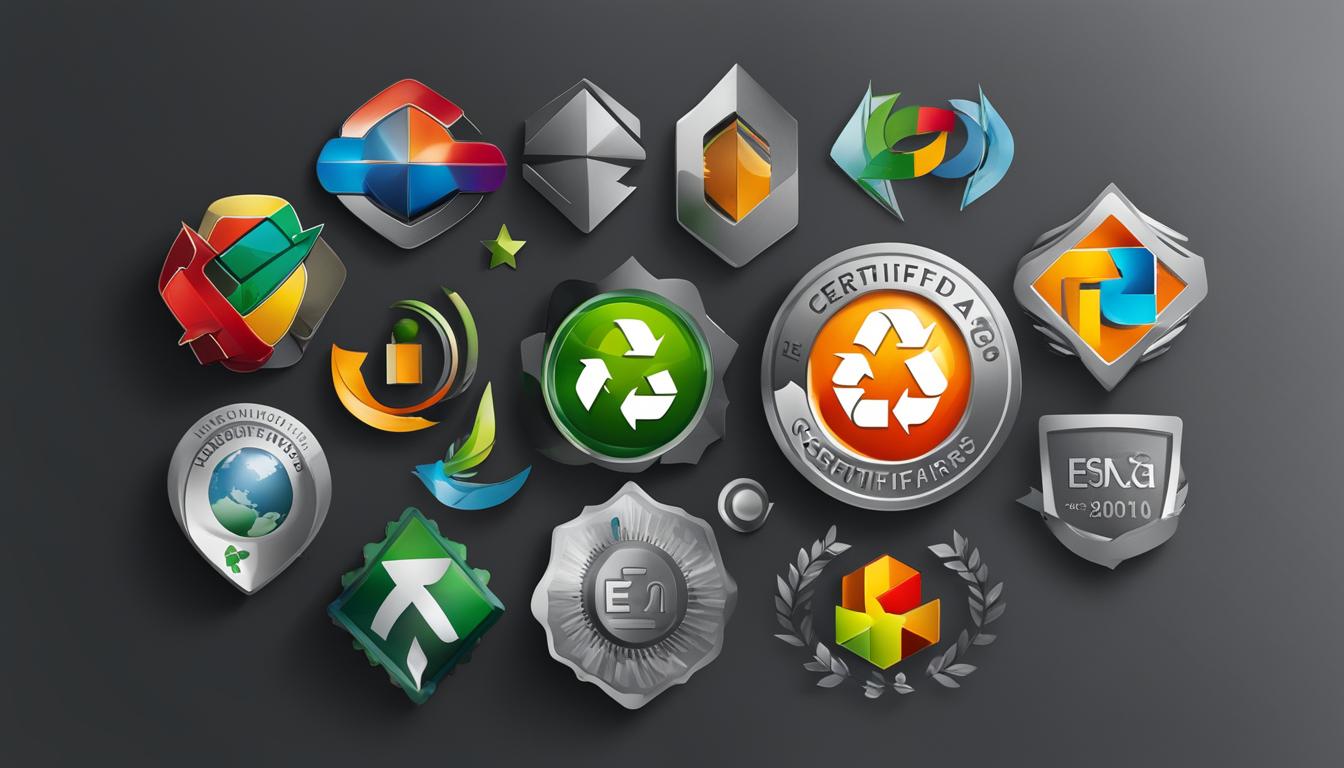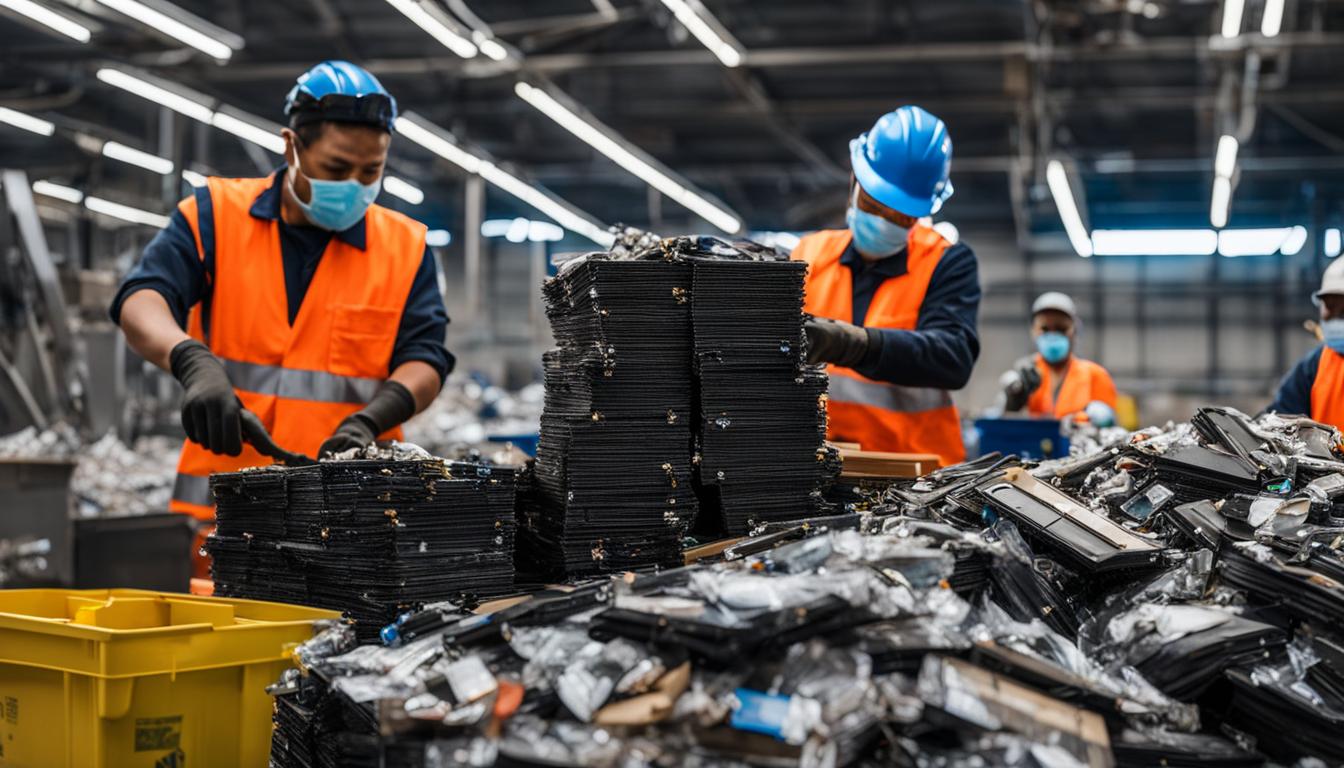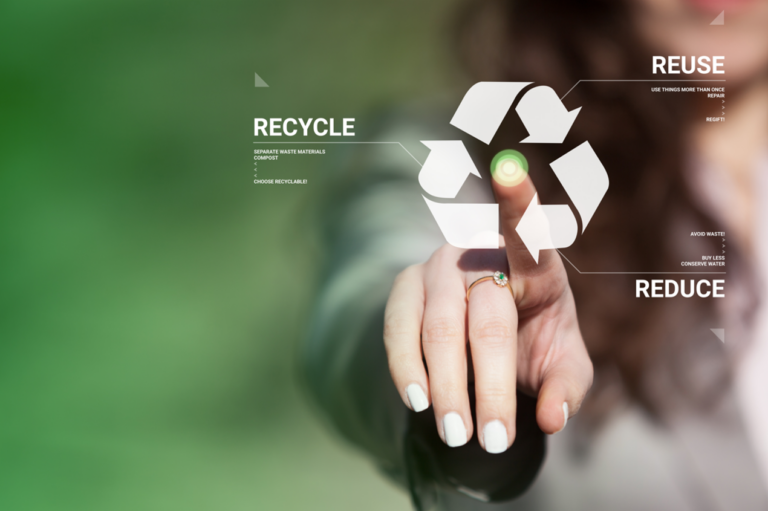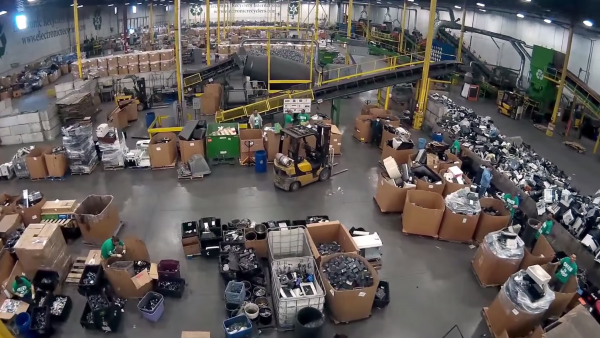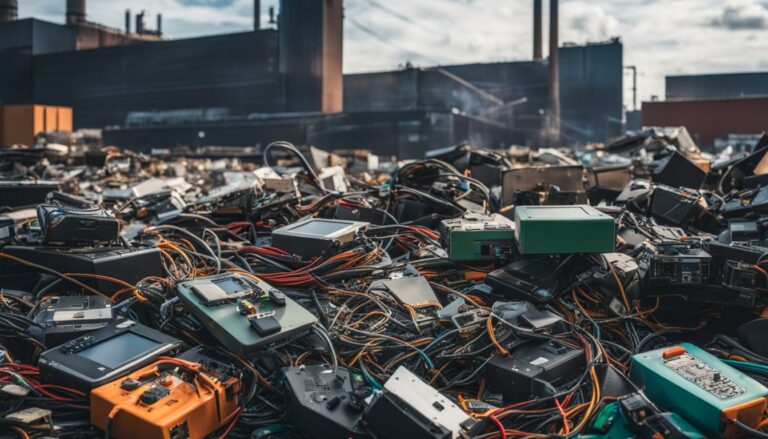Exploring International IT Recycling Standards
International IT Recycling Standards play a crucial role in ensuring safe and ethical IT waste management practices worldwide. These standards are designed to uphold strict industry safety and environmental guidelines.
Three key certifications in the recycling industry are RIOS, R2, and e-Stewards. RIOS is a globally recognized standard that integrates quality, environmental, health, and safety management systems for recyclers of various commodities. The R2 certification focuses specifically on the electronic waste industry, ensuring responsible recycling practices and the reduction of environmental and social impacts. The e-Stewards certification is the highest e-waste recycling certification, guaranteeing compliance with international and local e-waste laws.
Key Takeaways:
- International IT Recycling Standards ensure safe and ethical IT waste management practices.
- RIOS, R2, and e-Stewards certifications are critical in the recycling industry.
- These certifications promote responsible recycling practices and reduce environmental and social impacts.
- International collaboration is essential for effective IT recycling practices.
- Adherence to global IT recycling criteria is crucial in addressing the e-waste problem and promoting sustainability.
The Importance of Recycling Industry Certifications
Recycling industry certifications play a crucial role in promoting environmental IT recycling standards and international electronic waste management. These certifications ensure that recycling companies adhere to strict guidelines regarding safety, environmental responsibility, and secure data processing. By obtaining certifications such as RIOS, R2, and e-Stewards, organizations demonstrate their commitment to ethical and sustainable IT disposal practices.
One of the key benefits of recycling industry certifications is the assurance they provide to consumers. With the increasing concern about the impact of e-waste on the environment, individuals and businesses want to ensure that their electronic devices are disposed of responsibly. By choosing a recycling company with certifications, customers can trust that their electronic waste will be handled in a way that minimizes environmental harm and protects their data security.
Furthermore, recycling industry certifications contribute to the development of a global standard for IT recycling. By establishing and maintaining these standards, certifications like RIOS, R2, and e-Stewards encourage consistent and responsible recycling practices worldwide. This collaboration and adherence to global IT recycling criteria are essential for addressing the e-waste problem and promoting a circular economy.
The Benefits of Recycling Industry Certifications:
- Provides assurance that recycling companies follow ethical and sustainable IT disposal practices
- Minimizes the environmental impact of electronic waste
- Protects data security during the disposal process
- Contributes to the development of a global standard for IT recycling
- Promotes a circular economy by encouraging responsible recycling practices
| Certification | Description |
|---|---|
| RIOS | A globally recognized standard that integrates quality, environmental, health, and safety management systems for recyclers of various commodities. |
| R2 | Focuses specifically on the electronic waste industry, ensuring responsible recycling practices and the reduction of environmental and social impacts. |
| e-Stewards | The highest e-waste recycling certification, guaranteeing compliance with international and local e-waste laws. |
“By obtaining recycling industry certifications, organizations demonstrate their commitment to ethical and sustainable IT disposal practices.” – Recycling Expert
The Role of Global Standards in Recycling and Resource Recovery
Global standards for IT recycling are essential in promoting consistent and effective recycling and resource recovery practices worldwide. These standards ensure that electronic waste is handled responsibly, minimizing its impact on the environment and human health. Two key certifications, the Recycled Claim Standard (RCS) and the Global Recycled Standard (GRS), set criteria for third-party certification of recycled materials and chain of custody.
The Recycled Claim Standard (RCS)
The Recycled Claim Standard (RCS) provides a common framework for verifying recycled content in products and ensuring responsible sourcing. It defines and aligns the definition of “recycled” across various industries and verifies that materials meet specific requirements to be considered recycled. This standard allows brands and consumers to make informed purchasing decisions based on the recycled content of products.
The Global Recycled Standard (GRS)
The Global Recycled Standard (GRS) goes beyond the RCS by promoting climate-friendly processing and reducing the negative environmental impact of production. It encourages higher proportions of recycled content in products, incentivizing companies to prioritize the use of recycled materials. The GRS also emphasizes responsible practices throughout the supply chain, including social and environmental criteria that contribute to a circular economy.
By adhering to these global standards, recyclers and manufacturers can contribute to a more sustainable future by reducing waste, conserving resources, and minimizing the environmental and social impacts of production and consumption. These standards provide a roadmap for responsible recycling and resource recovery, benefiting both the planet and future generations.
| Recycling Standard | Key Features |
|---|---|
| Recycled Claim Standard (RCS) | Verifies recycled content in products |
| Global Recycled Standard (GRS) | Promotes climate-friendly processing and higher proportions of recycled content |
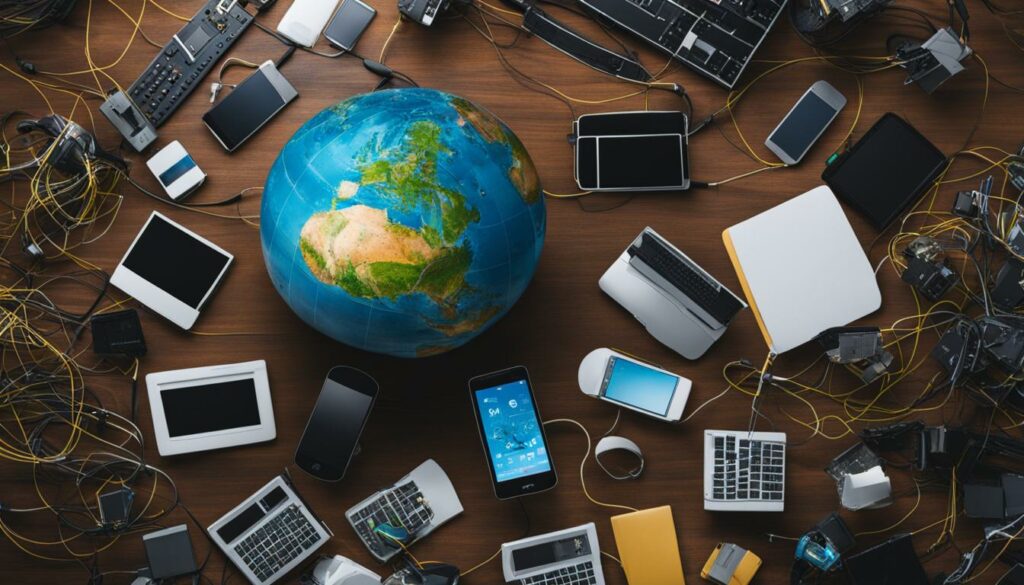
“Adhering to global recycling standards is vital in promoting a circular economy and sustainable resource management. These certifications provide a level of transparency and accountability, ensuring that products are made with recycled materials and produced in an environmentally responsible manner.” – Industry Expert
The Environmental and Health Impacts of E-Waste
E-waste, or electronic waste, poses significant environmental and health risks when not properly managed. The improper disposal and recycling of electronic devices can lead to the release of hazardous substances, such as heavy metals and toxic chemicals, into the environment. This contamination can have far-reaching consequences, impacting both ecosystems and human health.
By adhering to sustainable IT disposal practices and obtaining e-waste recycling certifications like R2 and e-Stewards, the industry and consumers can help mitigate the environmental and health impacts associated with e-waste. These certifications ensure that electronic waste is handled responsibly, reducing the risk of hazardous materials entering the environment.
It is crucial that we address the issue of e-waste and its impact on our environment and health. Through the implementation of global IT recycling criteria, such as those provided by certifications like R2 and e-Stewards, we can promote a more sustainable approach to IT waste disposal. By working together and adopting responsible recycling practices, we can protect our planet and create a healthier future for all.
The Environmental and Health Impacts of E-Waste
| Environmental Impacts | Health Impacts |
|---|---|
| Contamination of soil, water, and air | Exposure to heavy metals and toxic chemicals |
| Depletion of natural resources | Respiratory problems |
| Energy consumption | Neurological disorders |
“Proper handling and recycling of e-waste is crucial to prevent the release of hazardous substances into the environment and protect human health.” – Environmental Protection Agency (EPA)
The Importance of International Collaboration in IT Recycling
International collaboration plays a crucial role in promoting effective and responsible IT recycling practices worldwide. With electronic waste becoming a global issue, it is essential for countries to work together and adhere to international standards. International IT Recycling Standards, such as RIOS, R2, and e-Stewards, provide a common framework for recyclers worldwide, ensuring consistent and responsible recycling practices.
By following these global standards and guidelines, countries can address the growing e-waste problem and protect the environment. International collaboration allows for the exchange of knowledge and best practices, enabling countries to learn from each other and improve their IT recycling processes. It also fosters innovation in recycling technologies and promotes the development of sustainable resource management practices.
The Benefits of International Collaboration in IT Recycling
- Knowledge sharing: International collaboration allows countries to share their expertise, experiences, and best practices in IT recycling, leading to improved recycling processes and technologies.
- Efficiency and cost-effectiveness: By working together, countries can achieve economies of scale, reducing costs and improving the efficiency of IT recycling operations.
- Environmental protection: International collaboration ensures that IT recycling practices adhere to global environmental standards, minimizing the impact of electronic waste on ecosystems and human health.
- Sustainable resource management: Collaborative efforts in IT recycling contribute to the development of a circular economy, where valuable resources are recovered and reused, reducing the need for raw materials extraction.
Through international collaboration and the adoption of global IT recycling criteria, countries can tackle the e-waste problem more effectively and create a more sustainable future. By working together, we can ensure the responsible management of IT waste and promote environmental preservation for generations to come.
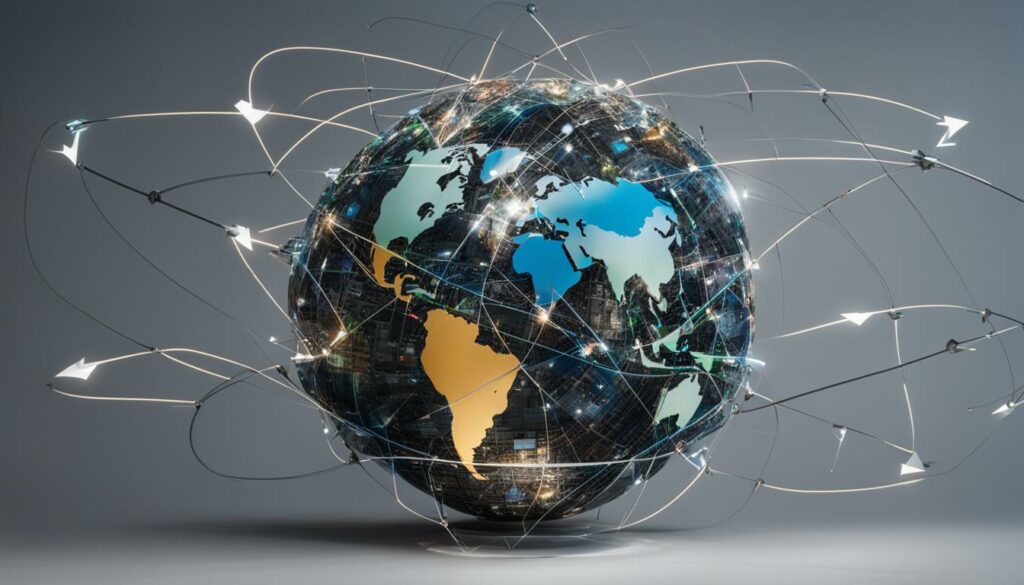
Conclusion
International IT Recycling Standards are indispensable in ensuring safe and ethical practices for managing IT waste on a global scale. With certifications such as RIOS, R2, and e-Stewards, recyclers demonstrate their commitment to environmental responsibility, secure data processing, and the reduction of environmental and social impacts.
By adhering to these standards, both recyclers and consumers contribute to a more sustainable and environmentally conscious approach to IT waste disposal. These guidelines not only ensure the proper handling of electronic waste, but also promote the responsible management of resources.
International collaboration and adherence to global IT recycling criteria are vital in addressing the pressing issue of e-waste and promoting a circular economy. By working together, we can strive towards a more sustainable future where IT recycling guidelines and IT waste disposal regulations are followed worldwide.
FAQ
What are International IT Recycling Standards?
International IT Recycling Standards are guidelines and certifications that ensure safe and ethical IT waste management practices globally.
What are some key certifications in the recycling industry?
Some key certifications in the recycling industry include RIOS, R2, and e-Stewards.
What is RIOS certification?
RIOS is a globally recognized standard that integrates quality, environmental, health, and safety management systems for recyclers of various commodities.
What is the R2 certification?
The R2 certification focuses specifically on the electronic waste industry, ensuring responsible recycling practices and the reduction of environmental and social impacts.
What is the e-Stewards certification?
The e-Stewards certification is the highest e-waste recycling certification, guaranteeing compliance with international and local e-waste laws.
Why are recycling industry certifications important?
Recycling industry certifications demonstrate compliance with strict industry standards, including safety, environmental responsibility, and secure data processing. They ensure ethical and sustainable IT disposal practices.
How do these certifications contribute to a more sustainable approach to IT waste management?
Certifications like RIOS, R2, and e-Stewards ensure that electronic waste is handled responsibly, minimizing its impact on the environment and human health.
What are the Recycled Claim Standard (RCS) and Global Recycled Standard (GRS)?
The RCS and GRS are certifications that set criteria for third-party certification of recycled materials and chain of custody, promoting responsible recycling and resource recovery practices.
What environmental and health risks does e-waste pose?
Improper disposal and recycling of electronic devices can lead to the release of hazardous substances into the environment, contaminating soil, water, and air. This can impact ecosystems and human health.
How can e-waste recycling certifications mitigate the environmental and health impacts of e-waste?
Certifications like R2 and e-Stewards ensure responsible recycling practices and compliance with international e-waste laws, reducing the harmful impact of e-waste on the environment and human health.
Why is international collaboration important in IT recycling?
Electronic waste is a global issue that requires a coordinated effort and adherence to international standards. International IT Recycling Standards provide a common framework for recyclers worldwide, ensuring consistent and responsible recycling practices.

